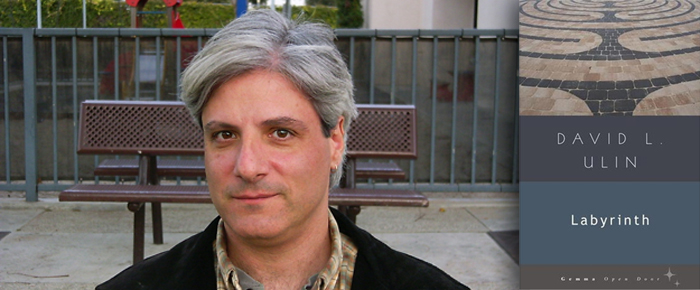
By Heidi Simmons
—–
Labyrinth
by David Ulin
Fiction
—–
Every day and every week, Los Angeles Times Senior Book Critic David Ulin must contemplate, consider and critique what he reads and then carefully articulate his thoughts for publication. His seniority has allowed him to pick and choose the books that most appeal to him. His interests are wide and eclectic, making his reviews well-informed, unexpected and provocative.
Besides being a book critic, Ulin is a writing professor and an author. He writes non-fiction and fiction. In his novella, Labyrinth (GemmaMedia, 100 pages), Ulin’s protagonist contemplates, considers and critiques his life at middle age. Un-named, the character is in a place where he can look back and forward, but struggles to find peace in the moment.
A father of two teenagers and married two decades, the middle-aged man is alone on an inconsequential business trip in San Francisco. It is the place where he first realized he was an adult, free and independent. It is a city he loves and has shared with his wife and kids. It is a place where he has history.
As he walks about the colorful landmarks and steep city streets, he recollects events and the people with whom he crossed paths. Some are important and some are not. He wonders how much these places and people shaped his life and his character.
When he meets an old friend for drinks, she has brought an unexpected guest –- his first girlfriend — the one he experienced all his important “firsts.” But the exchange is weird, uncomfortable and uninteresting to him. He finds himself further contemplating his past and himself as a person.
The character desperately tries to analyze his actions as a youth with what he knows now. He thinks of his son who is the same age he was when he last saw the girlfriend. He considers his daughter’s teenage sensitivity toward boys and love. His memory of the experience with the girlfriend sickens him because there is nothing he can do to change the past.
When he walks around town on his last day in the city, he ponders his future. He is indeed in love with his wife and kids, and knows they are a big part of whatever will come next. But with all great journeys, he learns a valuable lesson: To be in the present.
When he gets overwhelmed trying to understand Who he is and Why he is, he’s reminded to be here now. “Be Here Now” is the title of an actual book by guru Ram Dass. It was a favorite of his about being in the moment. He begins to really understand what it means to “be here now.” Worrying about the past or future only eats up the present and changes nothing. He learns to stop the frustrating, plaguing, examining voices and be at peace with himself in a city he loves or wherever he might be. The middle-aged man not only walks the labyrinth of the San Francisco streets, but that of his fragile existence and complex mind seeking the quiet center.
Labyrinth is a beautiful meditation on life. It is a coming-of-age story about a man appreciating who he is now and the things that make his life real and meaningful. This thin compact book takes place in a brief three days with barely any external conflict or drama. It is all internal. His inner voice speaks with maturity and honesty. It is an identity crisis rather than a middle-age crisis.
The life of the protagonist is not filled with extra ordinary events that make him shake his fist at God, demanding an understanding. He is a good man, self-aware, who takes responsibility for his actions in the healthiest way he can by accepting life, forgiving himself and being present. Introspection is not always easy.
Labyrinth can be easily read in one sitting. I recommend reading it more than once for the wisdom, inherent questions and the answers it subtly conveys. The book is poetic, a love story and a travelogue — sometimes all at once. How wonderful it is to exist.








































